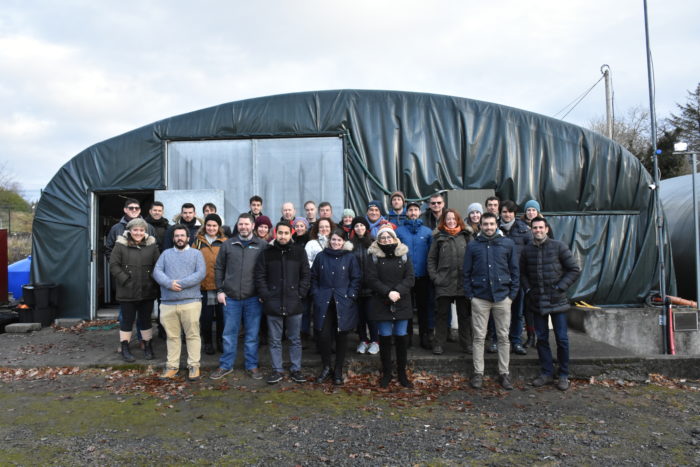Key points about this IMTA site in Ireland
- Name of the site: Keywater Fisheries
- Location: Cloonloo, Co. Sligo, Ireland
- Type of aquaculture production: Inland Freshwater
- Provided by: Marine Institute
This IMTA site was visited by IMPAQT partners in November, 2019

Interview
- Interviewee: Joanne Casserly, Scientific and technical officer at Marine Institute
- About the Keywater Fisheries freshwater aquaculture production site located in Cloonloo, Co. Sligo, could you tell us a bit about this pilot in terms of size, scale and production?
- JC: Keywater Fisheries is a family run fish farm located in Co. Sligo between Lough Key and Lough Gara, near the town of Boyle. Keywater produces Perch for the table in environmentally friendly and sustainable pond rearing systems, where good water quality is maintained by plants and algae that naturally grow on their farm. The farm is on a 1.5 hectare site and comprises of a hatchery, nursery, broodstock unit and 3 outdoor spilt-ponds. Keywater have volunteered to help the Impaqt project as one of the pilot sites, and to promote and support the eco-intensification of aquaculture. We are delighted to have then on-board and thank them for their time and effort in supporting the project to date, and look forward to working with then throughput the project. Keywater Fisheries recognise the importance of preservation of the environment and its resources and are keen to explore new eco-friendly rearing systems and adopting new energy-savers technologies – so they are a perfect fit with the Impaqt project.
Keywater produces Perch for the table in environmentally friendly and sustainable pond rearing systems, where good water quality is maintained by plants and algae that naturally grow on their farm.
- Why was this site chosen to be a pilot for the IMPAQT project?
- JC: Wild fish stocks and fresh water resources are under increasing pressure around the world from rising demand. The aim at Keywater is to produce fish in the most sustainable way possible, by using less water than traditional fish farming methods. They believe that healthy fish grown in a natural environment results in the finest quality product, and their innovative split pond design allows them to do just that. Keywater Fisheries recognise the importance of preservation of the environment and its resources and are keen to explore new eco-friendly rearing systems and adopting new energy-savers technologies – so they are a perfect fit with the IMPAQT project.
- What are the current practices that relate to Integrated Multi-Trophic Aquaculture? Could you describe for us the ecosystem living in this site?
- JC: The split-pond technology at Keywater is a novel approach to freshwater aquaculture and has potential to improve water treatment (sediment and nutrient removal) within a recirculation system. Demonstrating the benefits of this bio-mitigation aspect of IMTA is a key priority, but so also is the demonstration of the advantages of IMTA in maximising the production from a pond and optimising the use of areas by utilising multiple species.
The split-pond technology at Keywater is a novel approach to freshwater aquaculture and has potential to improve water treatment (sediment and nutrient removal) within a recirculation system.
- What are the expected benefits from IMPAQT for this site?
- JC: The IMPAQT project and management platform will be invaluable in helping to progress the Perch sector into a modern, high-tech freshwater aquaculture industry, and to help access the suitability of utilising marginalised land/areas for perch farming. The novel split-pond culture technique, used at the Keywater site, has the potential to open up greater areas of marginalised land to freshwater pond culture. The IMPAQT management platform can be a key tool in demonstrating the suitability and adaptability of the approach. IMPAQT will demonstrate the benefits of IMTA by providing quality and reliable data and information to support the case for IMTA production. The use of IMPAQT data and real time detailed monitoring and early warning and alarm systems will provide better insights into the fish health and system behaviour, and more reliable and better quality environmental information allowing for more efficient IMTA methodology.
The novel split-pond culture technique, used at the Keywater site, has the potential to open up greater areas of marginalised land to freshwater pond culture. The IMPAQT management platform can be a key tool in demonstrating the suitability and adaptability of the approach.
- What are the required parameters to be monitored in site/tests to be held for IMPAQT?
- There are a large number of parameters being monitored. The increased availability, quality, frequency and reliability of data about the system will allow for quicker response times to environmental changes and proactive fish welfare. This will also assist in quantifying environmental impact allowing opportunity to minimise these in real time. The IMPAQT project will improved the technology for monitoring of IMTA and for the management of the complex system and environment at an IMTA site, leading to improved efficiencies and minimised environmental impacts.
- Have you identified some replicabilities/lessons learned from this site to others?
- JC: It is early days in the project but we aim to make any innovations developed replicable for other aquaculture facilities
- Could you share with us some pictures of the site?
- JC: Yes! Check the video below and do not forget to follow Keywater Fisheries on facebook and twitter!






